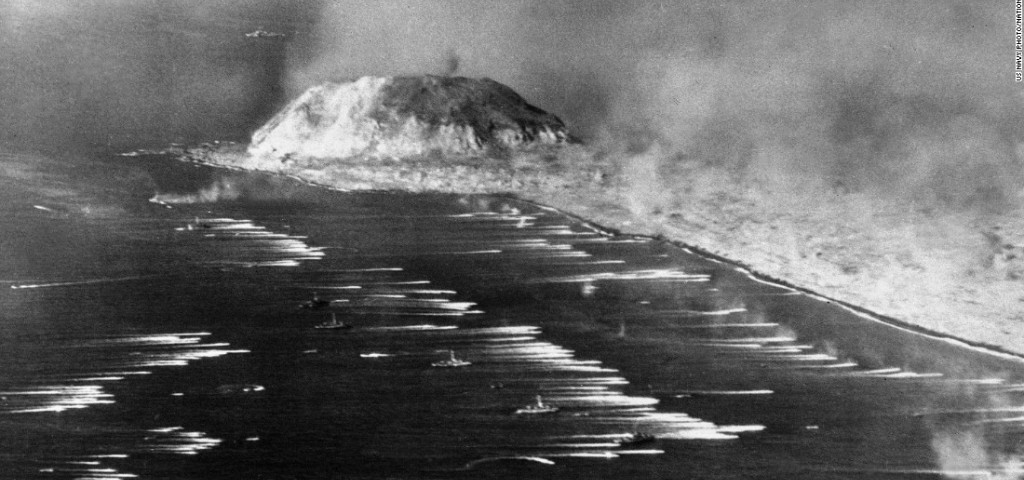Consequences We Pay : A.G. Romano – Story From Iwo Jima

There Are Things We Don’t Forget – Mr. Gene Pfeifer
May 13, 2016
Time Is Of The Essence : Frank’s Story From The Pacific
June 7, 2016“A marine does not disobey orders.” – A.G. Romano
I completed the majority of my interviews in-person, but there were also people who elected to send me their stories. Mr. Romano was one of those people and he sent to me pages and pages of his hand-written story. Having someone’s story written out on sheets of paper by that individual and then reading that story was another way for me to travel back in time. Through someone’s own words transcribed on the paper, I was able to learn about their life experiences. Through their very own words written on the paper, I was able to uncover their stories.
Mr. Romano was a U.S. marine in the Pacific during WWII. Mr. Romano began,
“My story is not about charging a machine gun nest or saving a life, it is not about blood and guts as most are. My story is about the artillery and the occupation of a country. It’s a story that doesn’t get told very often because our big guns kill from a long distance and in most cases the artillery gun crews or we members of the “artillery fire control” don’t see the body count.”
According to A.G. Romano, “Iwo Jima was a different kind of battle, an unseen enemy that had to be blasted out of “Pillboxes” near the beach and burned out of caves with flame throwers on the backs of Marines or longer range mounted on tanks.”
Decision to Enlist
Mr. Romano’s war story begins with him enlisting. Listening to the radio and reading the newspaper about events of the War in the Pacific, he became angrier at the Japanese as each story was told. At age seventeen in his senior year of high school, Mr. Romano decided that he must join the Marines in fighting back. Since there was not a recruiting office in his home town in New Jersey, he took the bus to the New York City recruiting office and enlisted. He had to have his parent’s signature in order to make it legal. Out of 500 enlistees, thirteen of them were accepted in the Marine Corps while others had a choice of Army or Navy.
Not long after that, Mr. Romano experienced boot camp. He attended a very tough boot camp. He earned his first stripe as P.F.C. Earning a stripe in the Marine Corps in that era was very difficult. He was point man of the platoon. He “kept the rhythm and direction as required.” One time, about fifty feet ahead, he could see a large hole in the street within the line of their marching. He thought that the Lieutenant would also see it and maneuver the men around it. Instead, the Lieutenant failed to see it and since it was directly in Mr. Romano’s line of sight, he had a decision to make. If he stopped the platoon by not continuing to march, he would be disobeying orders.
If he continued to march, he would end up in the hole with other squad members piling in on top of him. At this point in his story, he noted, “A marine does not disobey orders.” After he and one other squad member landed at the bottom of the ten foot hole, the D.I. gave the order to halt. Mr. Romano concluded, “The embarrassed LT simply left. No damage done except the LT’s ego.”
Another story about his experiences in boot camp detailed an episode that involved only him while on guard duty at about midnight. His post included the area adjacent to the officer’s quarters. That particular day, they had been told a child had been molested on the base and all men on guard duty should be especially alert to any person roaming the grounds. As he approached the incinerator near the boundary of the officer’s quarters, he heard a noise and called out, “who goes there?” After repeating it twice, a man came out from behind the incinerator.
He then began calling for the office of the Guard loud and clear. After a few minutes of Mr. Romano’s yelling, another man came running towards him and the man was holding at point, a bayonet. Mr. Romano halted him and informed both, that “should either one move they would feel the point of my bayonet where the sun don’t shine.” Neither one moved. Since Mr. Romano was only “Boots,” he was not issued bullets. It turned out that the first man was a Janitor and the second, an officer. He finished telling me about this episode, “Alls well that ends well, I did my duty.”
Camp Pendleton
After Mr. Romano graduated boot camp, he was transferred to Camp Pendleton as a member of the H&S Battery, 3rd Battalion, 13th Marines, and 5th Marines Division. He was a member of a twelve man unit and he was assigned to be Artillery Line Control and Forward Observers in combat when necessary. He underwent more training at Camp Pendleton. From there, he was transferred to Hawaii, where his base camp was located on part of the King Cattle Ranch on the big island of Hawaii, not far from Hilo. They set up targets at the base of the volcano there and directed fire for yet bigger guns. One morning, Bill Young and Mr. Romano were ordered to set up targets on the lava bed created by the Volcano. He had just received a new pair of “Boon Dockers” (shoes). After walking across the lava bed and back, he needed another pair of shoes.
Sadly, they lost one Marine during nighttime maneuvers. The man was run over by a tank. As I read this part of Mr. Romano’s story, I paused. Of course, war stories are filled with statistics about men whom we have lost as they serve our country in the line of duty. The man who was run over by a tank was a detail in Mr. Romano’s story. I didn’t even know his name. An accident happened during nighttime maneuvers and he lost his life. That was simply one of scores of sacrifices that were made by men who lived in U.S.A. at the time and they were serving overseas during WWII. We read about wars in gross generalizations. We read about casualties and loss of life by the millions. Reading Mr. Romano’s sentence about his fellow Marine made me reflect. Each act matters. The culmination of WWII (Allies winning the war) came about because of the sacrifices that numberless individuals from the G.I. generation made for us.
Not long after this incident, they boarded ship at Hilo for parts unknown. They left their sea bags on the docks at Hilo. They departed and a Hurricane flooded Hilo “taking all of their sea bags out to sea.” Mr. Romano and the other Marines lost all of their belongings. As had happened in countless other stories that I heard, as I read this Marine’s story and underlined part of his story, I contemplated and I realized that details like losing those bags are lost in the generalized Histories that we read in the textbooks.
At Sea
At sea, they encountered typhoon type of weather. The entire flotilla of ships was in the path of one of the worst storms in history. During this storm, the Marines experienced waves so high that they made the ships stand on end with first the bow pointing down followed by the stern. Mr. Romano thought that the ship would go down, but luckily the ship survived the pounding. After surviving the storm, they were told that their mission “was to take Iwo Jima.”
By this time in WWII, the war was taking a huge toll on the young men in the Pacific and American parents were upset and complaining to Congress and President Roosevelt. Mr. Romano wrote, “In those days, both Houses of Congress and the President listened to the people to a much greater extent than they do now.” He continued to explain that the attitude of the elected officials was then to serve the people. He added, “which is why Roosevelt served four terms.”




